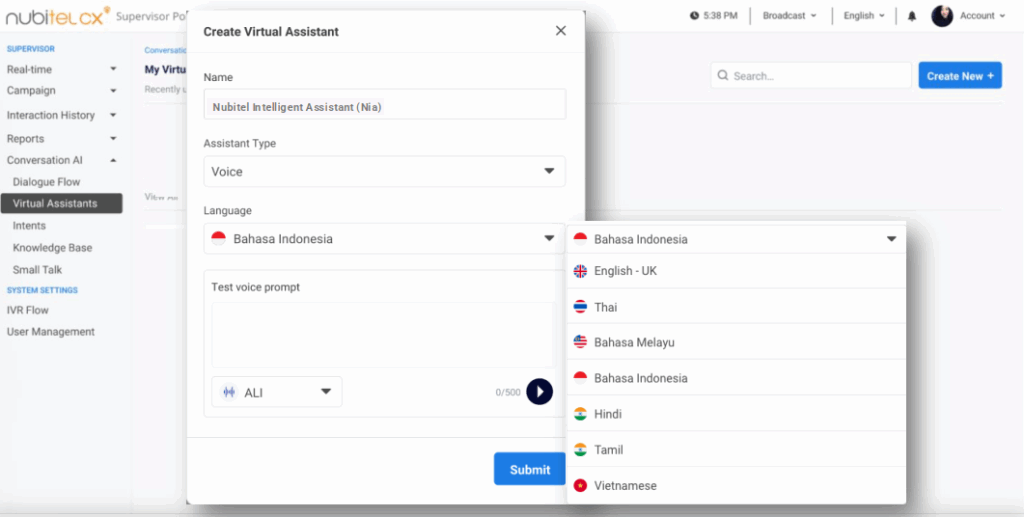Voice remains the most relied-upon channel for customer service, particularly when issues involve urgency, complexity, or trust. McKinsey research indicates that phone conversations are still the preferred method of problem resolution across all age groups, including digital-first Millennials. However, outdated systems such as traditional IVR menus and long hold times continue to frustrate customers, with studies showing that 61% of consumers switch providers after a single negative phone experience.
This gap between customer expectations and existing phone systems has driven enterprises toward a new solution: the Voice AI Agent. Unlike legacy systems that rely on rigid scripts, Voice AI Agent combines speech recognition, natural language understanding, and backend integrations to deliver seamless, personalized, and human-like interactions.
Gartner projects that by 2026, 10% of agent interactions will be automated by AI, up from less than 2% today, signaling rapid enterprise adoption. Rather than simply cutting costs, Voice AI Agent are being deployed to improve customer satisfaction, increase operational efficiency, and create scalable service models across industries.
This article examines what Voice AI Agent are, their customer and enterprise benefits, key industry use cases, and the trends shaping their role in the future of customer service.
Table of Contents
ToggleWhat is a Voice AI Agent in Customer Service?
A Voice AI Agent is an AI-powered virtual assistant that interacts with customers via phone calls or voice channels. It listens to the customer’s request, interprets intent using NLP, retrieves relevant data from integrated systems such as CRM or ERP, and responds in natural-sounding speech.
How Voice AI Agent Work
Voice AI Agent is powered by a combination of technologies that make conversations seamless:
- Listen and transcribe (Speech to Text) – The customer’s voice is transcribed in real time, even in noisy environments, using advanced acoustic models.
- Understand user intent (Natural Language Processing) – Extracts intent, meaning, and sentiment. For example: “I think I was charged twice” is classified as a billing dispute, not just a generic payment query.
- Trigger the right workflow (Backend integration) – The Voice AI Agent connects with enterprise systems (CRM, ITSM, ERP) to perform tasks such as retrieving order details, updating records, or logging service tickets.
- Respond naturally (Text to Speech) – The result is converted back into natural, human-like speech with appropriate tone and pacing.
Unlike traditional IVR menus, which rely on rigid “press 1 for billing” options, a Voice AI Agent understands natural phrasing, manages interruptions, and maintains conversational context across the entire interaction.
Benefits of Voice AI Agent for Customers Service
While enterprises often adopt Voice AI Agent to reduce operational costs, the true long-term value lies in enhancing customer experience. By delivering faster, more personalized, and inclusive interactions, Voice AI Agent reshapes how customers engage with businesses. Below are the key customer-side benefits explained in detail:
1. No Waiting on Hold
Traditional call centers often leave customers waiting for minutes, sometimes even hours, creating frustration and reducing loyalty. Voice AI Agent addresses this challenge by providing instant responses. Advanced speech recognition allows AI Agents to interpret a customer’s request immediately, whether it’s checking an order status, booking an appointment, or troubleshooting a basic issue.
For example, if a customer calls to confirm a delivery, Voice AI Agent can instantly verify order details and update the status without transferring to a human agent. By eliminating hold times and repetitive transfers, customers save significant time, which directly improves satisfaction.
Enterprise impact: Reduced first response time boosts CSAT (Customer Satisfaction Scores) and decreases churn. Faster resolutions also reduce operational bottlenecks, allowing human agents to focus on more complex queries.
2. Personalized, Multilingual, and Always Available
Voice AI Agent excels at providing personalized experiences by leveraging customer history and preferences. Using AI-driven CRM integration, the system can recognize repeat customers, recall previous interactions, and proactively suggest solutions.
Moreover, Voice AI Agent operates 24/7 and can support multiple languages, breaking down communication barriers. For instance, Nubitel’s Voice AI Agent supports Bahasa Melayu, Bahasa Indonesia, Thai, and more, allowing brands to deliver consistent experiences across diverse markets. Enterprises can also customize the AI’s voice, tone, and personality, ensuring that the service aligns with their brand identity.

Set up a Voice AI Agent in multiple languages with Nubitel CX for scalable customer support.
Enterprise impact: Customers feel understood and valued, strengthening loyalty. Multilingual and round-the-clock support ensures no potential customer is lost due to language limitations or inconvenient hours.
3. Frictionless Conversations
One of the most significant frustrations in traditional call centers is rigid IVR menus and the need to repeat information multiple times. Voice AI Agent eliminates these pain points by maintaining conversational context. Advanced natural language understanding (NLU) allows the AI to recognize interruptions, handle follow-up questions, and dynamically adapt its responses based on the conversation flow.
For example, a customer asking about both a billing issue and a product return can receive a seamless, single-session solution without being transferred multiple times.
Enterprise impact: By minimizing friction, Voice AI Agent reduces call abandonment rates and enhances Net Promoter Score (NPS). Customers experience smoother, more intuitive interactions, translating to higher retention.
4. Accessibility for All
Voice AI Agent creates inclusive customer experiences. Customers who are visually impaired or less familiar with digital interfaces can navigate services using natural speech. Unlike mobile apps or online forms that rely on screen-based interactions, Voice AI Agent ensures accessibility without extra effort.
Additionally, Voice AI Agent can integrate with assistive technologies, such as screen readers or real-time transcription, further enhancing inclusivity.
Enterprise impact: Expanding accessibility broadens the potential customer base and reinforces brand reputation as socially responsible. It also encourages trust among customers who might otherwise feel underserved by traditional digital channels.
5. Consistency Between AI and Humans
A common challenge in hybrid support environments is ensuring consistency between automated and human interactions. Voice AI Agent addresses this by integrating with AI-ready knowledge bases and CRM systems. This allows the AI to provide accurate, up-to-date responses and, when escalation is necessary, seamlessly transfer the full conversation history to a human agent.
For example, if a customer encounters a complex technical problem, the AI can gather all relevant information and hand it off efficiently, ensuring that the human agent does not need to ask the customer to repeat themselves.
Enterprise impact: Efficient handoffs reduce resolution time, improve agent productivity, and maintain a consistent, high-quality experience across touchpoints. Customers feel valued and confident that their issues are being handled competently.
Use Cases of Voice AI Agent Across Industries
Every industry faces recurring challenges such as long wait times, high call volumes, and repetitive service requests. Voice AI Agent Agents address these challenges by adapting to different operational environments while maintaining consistency and accuracy.
Let’s explore how various industries are deploying Voice AI Agent Agents to improve service delivery and operational performance.
Banking, Financial Services, and Insurance (BFSI)
Banks and insurers use Voice AI Agent to provide account balance checks, claims processing, loan servicing, and policy updates. These functions require both speed and security, which Voice AI Agent achieve by authenticating customers, retrieving records, and resolving queries without lengthy transfers. This reduces operational costs and improves customer retention rates.
Healthcare
Healthcare providers deploy Voice AI Agent for appointment scheduling, reminders, prescription refills, and patient information updates. Many of these requests are routine but time-sensitive, making automation valuable for reducing no-shows, shortening scheduling cycles, and enabling staff to concentrate on patient care.
Retail and E-Commerce
Retailers and online marketplaces handle high volumes of calls related to order tracking, returns, and delivery updates. Voice AI Agent manage these repetitive tasks efficiently and contribute to smoother post-purchase experiences. Market forecasts project that the global voice commerce sector will grow from USD 42.75 billion in 2023 to USD 186.28 billion by 2030, underscoring the importance of voice-enabled customer interactions.
Travel and Airlines
Airlines and travel operators adopt Voice AI Agent for flight status updates, booking changes, and baggage inquiries. By providing real-time information during travel disruptions, they ease customer stress and improve service during peak demand periods.
Utilities and Telecommunications
Utility and telecom providers rely on Voice AI Agent for outage reporting, billing inquiries, plan upgrades, and troubleshooting. Automating these services reduces call spikes during emergencies and ensures consistent communication, which strengthens public confidence.
The diverse applications across industries highlight the scalability of Voice AI Agent. Looking ahead, ongoing innovation is set to expand their role within enterprise automation.
Future Trends in Voice AI Agent Adoption
The Voice AI Agent market is experiencing significant growth, with projections indicating a robust expansion in the coming years. According to a report by Market.us, the global Voice AI Agent market is expected to grow from USD 2.4 billion in 2024 to USD 47.5 billion by 2034, reflecting a compound annual growth rate (CAGR) of 34.8%
This growth is driven by advancements in speech recognition technology, natural language processing, and the increasing integration of Voice AI Agent solutions across multiple industries. As enterprises continue to adopt these technologies, the landscape of customer service is poised for transformation.
Under this evolution, trends such as enterprise-wide integration, emotion detection, multilingual scalability, and analytics-driven optimization are shaping the future of Voice AI Agent adoption. These trends indicate that Voice AI Agent will increasingly influence operational efficiency, customer satisfaction, and service scalability across sectors.
How Nubitel’s Voice AI Agent Enables Scalable Customer Experiences
Nubitel’s Voice AI Agent is designed to address common limitations found in traditional automation, such as rigid interaction flows and lack of natural conversational ability. Its advanced technology improves turn-taking to deliver more natural exchanges, while its scalability makes it suitable for industries with millions of monthly interactions such as BFSI and telecommunications.
The solution integrates seamlessly with enterprise infrastructure, ensuring fast deployment without disruption. It also enables performance tracking on metrics such as cost per interaction, first-call resolution, and customer satisfaction scores, allowing enterprises to measure outcomes objectively.
By functioning as both a conversation layer and an execution engine, Nubitel’s Voice AI Agent helps organizations strengthen customer relationships while maintaining operational efficiency.
Conclusion: Voice AI as a Revenue Engine
The adoption of Voice AI Agent reflects a broader shift in customer service strategy. Enterprises are moving from legacy systems that prioritize cost containment to AI-driven solutions that also improve retention, satisfaction, and long-term value.
The organizations that invest in Voice AI Agent today will not only streamline operations but also establish scalable, multilingual, and personalized service models that meet the expectations of global customers. As adoption accelerates, measurable success will increasingly be defined by improvements in customer lifetime value, loyalty, and operational resilience.
For enterprises looking to implement intelligent and scalable voice automation, Nubitel’s Voice AI Agent would be one of your strong choices. Contact us to schedule a free demo and see firsthand how Nubitel’s Voice AI Agent can transform your contact center, enhancing both service quality and operational efficiency.





